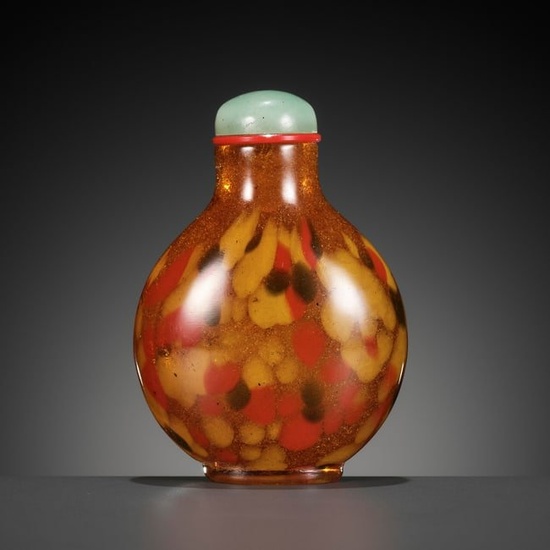A SANDWICHED SPECKLED AVENTURINE GLASS SNUFF BOTTLE, IMPERIAL GLASSWORKS, 1720-1860
A SANDWICHED SPECKLED AVENTURINE GLASS SNUFF BOTTLE, IMPERIAL GLASSWORKS, 1720-1860
China. The flattened globular body supported on a short oval foot and rising to a cylindrical neck. The translucent, richly speckled body finely decorated with red, yellow, and black splashes.
Provenance: The Collection of Alexander Brody, Honolulu, USA. Born in Budapest, Alexander Brody (1933-2022) built an impressive collection of Chinese snuff bottles, lending several pieces to the Metropolitan Museum of Art in New York city. In 1995, he collaborated with Clare Chu to produce a publication showcasing his collection.
Condition: Excellent condition with minor wear, manufacturing flaws, and traces of use.
Stopper: Aventurine and red glass
Weight: 55.2 g
Dimensions: Height including stopper 64 mm. Diameter neck 16 mm and mouth 6 mm
Sandwiching different colors of ground glass between two layers of clear glass was a technique used in snuff bottle production from early in the snuff bottle period to late in the Qing dynasty, and large numbers of these bottles were produced at the Imperial glassworks for distribution on a grand scale as gifts. The profusion of these sandwiched glass bottles and their inclusion in most early collections would seem to suggest that they were readily available from the mid-nineteenth century onwards.
A natural evolution of the sandwiched effect is the addition of a second layer of coloring to the outer layer of glass, achieved by rolling on further fragments of color. This provides considerable extra decorative potential, since it allows for a second layer of pattern to act as a counterpoint to the sandwiched layer. In view of the appeal of this effect so clearly demonstrated here, it is perhaps surprising the technique was not employed more often.
Literature comparison:
For a related glass snuff bottle dated to the 18th century, see Susan Page, Robert Hall: Chinese Snuff Bottles XV - The SB Collection, University of Toronto, 2011, p. 14, no. 66.
Sale price
Estimate
Time, Location
Auction House
A SANDWICHED SPECKLED AVENTURINE GLASS SNUFF BOTTLE, IMPERIAL GLASSWORKS, 1720-1860
China. The flattened globular body supported on a short oval foot and rising to a cylindrical neck. The translucent, richly speckled body finely decorated with red, yellow, and black splashes.
Provenance: The Collection of Alexander Brody, Honolulu, USA. Born in Budapest, Alexander Brody (1933-2022) built an impressive collection of Chinese snuff bottles, lending several pieces to the Metropolitan Museum of Art in New York city. In 1995, he collaborated with Clare Chu to produce a publication showcasing his collection.
Condition: Excellent condition with minor wear, manufacturing flaws, and traces of use.
Stopper: Aventurine and red glass
Weight: 55.2 g
Dimensions: Height including stopper 64 mm. Diameter neck 16 mm and mouth 6 mm
Sandwiching different colors of ground glass between two layers of clear glass was a technique used in snuff bottle production from early in the snuff bottle period to late in the Qing dynasty, and large numbers of these bottles were produced at the Imperial glassworks for distribution on a grand scale as gifts. The profusion of these sandwiched glass bottles and their inclusion in most early collections would seem to suggest that they were readily available from the mid-nineteenth century onwards.
A natural evolution of the sandwiched effect is the addition of a second layer of coloring to the outer layer of glass, achieved by rolling on further fragments of color. This provides considerable extra decorative potential, since it allows for a second layer of pattern to act as a counterpoint to the sandwiched layer. In view of the appeal of this effect so clearly demonstrated here, it is perhaps surprising the technique was not employed more often.
Literature comparison:
For a related glass snuff bottle dated to the 18th century, see Susan Page, Robert Hall: Chinese Snuff Bottles XV - The SB Collection, University of Toronto, 2011, p. 14, no. 66.



